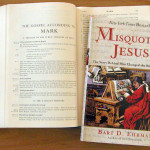The Bible and the Question of Miracles: Towards a Christian Response
by Dr. Matthew Ramage
Filed under The Bible
My previous post at Strange Notions underscored the often-unacknowledged philosophical premises at work when believers and non-believers sit down to debate about things biblical. In the course of my argument, I pointed to a possible area of common ground for Catholics and agnostics/atheists. A survey of statements by thinkers as different as Benedict XVI and Bart Ehrman reveals an important agreement upon the reality that everyone carries their own philosophical presuppositions and that a purely objective consideration of Jesus’ miracles is therefore impossible. Today I would like to carry forward this discussion. By way of doing this, I will first briefly summarize Bart Ehrman’s position on Jesus’ divinity and resurrection. Then I will critique what I consider to be an insufficient (but very common) Christian response to the skeptic’s position. Finally, I will dwell upon a couple keys given by C.S. Lewis and Pope Benedict XVI which point out from a Christian perspective the direction a philosophical dialogue about miracles needs to head.
Ehrman on Jesus’ Divinity and the Failure of the “Trilemma” Argument
Ehrman’s position concerning the divinity of Christ can be quickly grasped from his evaluation of C.S. Lewis’ famous “trilemma” argument. According to Lewis, Jesus’ lordship can be shown by reducing to the absurd the possibility that he was either a liar or a lunatic. But in Jesus Interrupted, Ehrman reveals a problem with Lewis’ logic:
"I had come to see that the very premise of Lewis’s argument was flawed. The argument based on Jesus as liar, lunatic, or Lord was predicated on the assumption that Jesus had called himself God…I had come to realize that none of our earliest traditions indicates that Jesus said any such thing about himself…not three options but four: liar, lunatic, Lord, or legend."
At the risk of oversimplifying Ehrman’s more lengthy narrative, his position is that Jesus’ disciples began to profess his divinity only after they experienced him as risen from the dead. According to Ehrman’s analysis of the data in How Jesus Became God, the earliest Christian sources (Paul and Mark) do not portray Jesus as divine but rather as an exalted human or an angel. While Jesus certainly existed as a historical person, for Ehrman he is nevertheless a “legend” in that he was not divine as Christians subsequently came to believe.
Ehrman on Jesus’ Resurrection
One of the interesting features of Ehrman’s work is that he affirms at least some direct followers of Jesus sincerely believed their master had been raised from the dead. He suggests that “three or four people—though possibly more—had visions of Jesus sometime after he died.” Ehrman states that the question of whether these putative experiences were veridical (i.e. whether Jesus was really there or whether they were hallucinatory bereavement visions) is beside his point. Rather, the claim he puts forth is the following:
"[A]nyone who was an apocalyptic Jew like Jesus’s closest follower Peter, or Jesus’s own brother James, or his later apostle Paul, who thought that Jesus had come back to life, would naturally interpret it in light of his particular apocalyptic worldview— a worldview that informed everything that he thought about God, humans, the world, the future, and the afterlife. In that view, a person who was alive after having died would have been bodily raised from the dead, by God himself, so as to enter into the coming kingdom."
In Ehrman’s view, then, it was the disciples’ own apocalyptic worldview (informed by Jesus’ teachings while he was alive) that led them to think of their visions of the crucified Jesus in terms of resurrection.
An Insufficient Christian Response
While the constraints of this post do not permit me to elaborate further on Ehrman’s arguments, it should be noted that they are formidable and cannot simply be written off without a robust response. For instance, I do not find satisfactory the response to this “quadrilemma” (Jesus is either a liar, lunatic, lord, or legend) in Kreeft and Tacelli’s Handbook of Christian Apologetics. With due respect to these thinkers whom I deeply admire (and who have likely provided more solid arguments in other texts outside of the present one), I think their response to the “legend” issue unfortunately evinces a rather common but simplistic understanding of the biblical evidence. The authors state that our extant biblical manuscripts contain “very few discrepancies and no really important ones,” but I think Ehrman’s books Misquoting Jesus, How Jesus Became God, and Jesus, Interrupted sufficiently disabuse one of the notion that the Gospels only differ in accidentals such as order and number. And Ehrman is by no means the only author who writes about this sort of thing; he is popularizing information that biblical scholars already know.
Moreover,Kreeft and Tacelli argue, “If a mythic ‘layer’ had been added later to an originally merely human Jesus, we should find some evidence, at least indirectly and secondhand, of this earlier layer.” Here I think the authors have an unduly narrow view of “myth,” and moreover I think they fail to anticipate the obvious response of a bible scholar like Ehrman. What might he say? The evidence for this earlier, non-mythical layer is right there in front of us: it is the Gospel of Mark, whom scholars by and large recognize to be the first gospel composed.
Finally, the authors of the Handbook ask who possibly could have invented such a myth about Jesus. I think they are on to something in remarking, “No one invents an elaborate practical joke in order to be crucified, stoned, or beheaded.” Ehrman agrees to some extent with this insofar as he does not seem to think that the disciples maliciously invented the myth of a divine Jesus. (Remember, in Ehrman’s view at least some of the disciples really thought they saw Jesus alive after his death, and it is this that eventually led them to conclude he was divine). The authors fail to envision this sort of counter-argument when they claim, “Whether it was his first disciples or some later generation, no possible motive can account for this invention.” It is indeed difficult for a Christian to imagine someone inventing the notion that Jesus was divine, but is it fair to say that “no possible motive” could account for this? Couldn’t the disciples themselves have been delusional, as Ehrman seems to suggest? Or couldn’t they have been using the “risen” Jesus as a power play for their own (ultimately unsuccessful) personal ambitions? Now as a believer I am certainly not saying that this is what actually happened, but one cannot properly call it an impossible scenario.
Where the Discussion Ought to Head: C.S. Lewis on Miracles
While C.S. Lewis may not have hit a home run with his “trilemma” argument in defense of Christ’s divinity, I think that his book Miracles is invaluable for those who wish to profess the divinity of Jesus in the face of modern biblical criticism. Lewis begins by arguing along the same lines of Benedict XVI and Ehrman as discussed in my previous post. He correctly observes that the real issue at hand is a philosophical one: “The difficulties of the unbeliever do not begin with questions about this or that particular miracle; they begin much further back.” For Lewis the miracles question boils down to whether or not the natural world we know is the only reality that exists. Looked at from another angle, this is the same as asking whether or not the supernatural or divine exists. A negative answer to the question of the divine’s existence necessarily entails the conclusion that purported miracles such as Christ’s resurrection cannot be true.
A positive answer, on the other hand, means the following for Lewis: “If we decide that Nature is not the only thing that is, then we cannot say in advance whether she is safe from miracles or not.” In other words, if there exists a Being which/who is not limited by the confines of the natural world but is rather the very ground of this world, then we can never conclusively deny that this Being sometimes acts in a way other than that which we tend to expect based on our observations of nature. Lewis thus proposes that within the universe “there are rules behind the rules, and a unity which is deeper than uniformity.” While Christians often speak of miracles as divine “interventions,” this unfortunately appears to presuppose that God is somehow “absent” from his creation and then “intrudes” upon it to perform a miracle. But in truth, if God exists he is always present to his creation. For Lewis, then, the miracles we take to be “interruptions” of nature’s history are in reality “expressions of the truest and deepest unity in [God’s] total work.”
Even if we personally are not conscious of having experienced the miraculous, Lewis reminds us not to discount the fact that our world is full of stories of people who claim to have experienced miracles. Moreover, even if we were to live an entire millennium our experience would not necessarily inform us whether a given miracle happened. Indeed, Lewis and Ehrman both acknowledge that miracles are by definition improbable. It is always more likely that the witnesses to the alleged miracle are lying or deluded than that the miracle actually occurred. And yet, even as we know fraudulent cases exist, these by no means discredit all such claims regarding the miraculous. On this score I myself tend to be very skeptical when people talk of miraculous healings on the one hand or demonic possessions on the other. But then every once in a while I hear an account of some such phenomenon directly experienced by someone I trust and know not to be psychologically imbalanced. These are the moments that make me reconsider the possibility that maybe such things happen after all even if I (thankfully, in the case of possessions) have never directly experienced them.
At the end of the day, Lewis is right: I would be arguing in a circle if I were to conclude that miracles have not occurred merely because I have not experienced them. The bottom line for Lewis is that our experience cannot prove nature is closed, i.e. that it never admits of what from our point of view might look like “interruptions.” To be sure, living sanely in the world requires that we assume the laws of nature continue operating as we have always experienced them (We should not jump out of a boat expecting the gravity to be suspended before we sink into the sea). In fact, Lewis argues that the existence of miracles presupposes that nature is governed by laws. But this does not mean that walking on water is per se impossible. The impossibility of miracles is not something that can be proved, only assumed.
Benedict XVI and the Question of an “Open Philosophy”
I would like to conclude this post by returning to my point of departure in the previous one. In his 1988 Erasmus Lecture, the future Pope Benedict XVI poignantly wrote that “the debate about modern exegesis is not a dispute among historians: it is rather a philosophical debate.” In the course of his lecture, Benedict called for a “criticism of the criticism,” a self-critique of the modern, historical-critical method of biblical interpretation. In the course of these two posts I have attempted to carry forward this critique in one small way, identifying the presence of philosophical presuppositions we bring to our reading of the biblical text and underscoring that believing miracles to be impossible is something people can only assume, not prove.
As one who daily engages in the craft of historical-critical exegesis, I find Benedict’s comments on this subject refreshing and liberating. In contrast with a naturalist, “ready-made philosophy” that precludes the possibility of miracles, the Christian approaches the Bible with an “open philosophy” that refuses to exclude the possibility that God himself “could enter into and work in human history, however improbable such a thing might at first appear.” This posture, deeply rooted in the Catholic tradition with its conviction that the boundary of time and eternity is permeable, allows for the Bible to be what the Church has always claimed it to be: the word of God in human words.
And yet when all is said and done, Christians should beware of thinking we have definitively proven that which we hold by faith. On the basis of reason alone we cannot conclude whether the Bible is the word of God, whether a given miracle has occurred, or whether Jesus rose from the dead. The real question undergirding all these has been given to us by Lewis. It is the question of whether or not God exists, whether we have independent reasons to believe that there exists a supernatural Being beyond the natural order, a Being to whom nature owes its existence and who may act within that order in ways we do not typically expect.
Read Lewis’ Miracles attentively, and there you will find well-argued reasons to believe that the answer to the above questions is “yes.” Moreover, even if you do not agree with him, I think you will find that he provides serious arguments which call into question whether a non-theistic worldview offers an intelligible account of the world in which we live. But this post’s aim remains much more modest in focusing on just one key thought from Lewis’ book: If we admit that nature is not the only thing that is—if we come to the conclusion that theism is true—then we are not “safe” from miracles. This by no means disproves atheism or agnosticism, but at least it points out one direction our dialogue needs to go.
Related Posts
Note: Our goal is to cultivate serious and respectful dialogue. While it's OK to disagree—even encouraged!—any snarky, offensive, or off-topic comments will be deleted. Before commenting please read the Commenting Rules and Tips. If you're having trouble commenting, read the Commenting Instructions.













